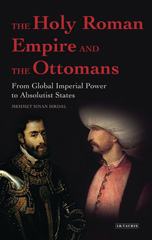2011 - Tauris
E-book
Digital Version
Streaming only | NO download | NO Copy/paste | NO Printing
The Holy Roman Empire and the Ottomans
224 p.
- Charles V's Holy Roman Empire and Suleyman I's Ottoman Empire were the most significant empires of the early-modern era. Both rulers exercised global power as the leaders of the universal "res publica Christiana" and "dar-es Islam," respectively, both subject to exploits of lavishness, extravagance, and self-indulgence with respect to their demonstrations of power and world dominance. The most obvious example of this was Charles V's crowning as the Holy Roman Emperor by Pope Clement V, which included a procession of 20 cardinals, 400 papal guards and 300 knights, as well as a commemorative painting by Parmigianino that depicted Charles being handed the globe by the infant Hercules while being crowned with laurel by Fame. The modality of power reflective of aristocratic society and exhibited by both Charles V and Suleyman I is one of many different style of leadership and Mehmet Sinan Birdal here explores how these power modalities determine the performance of a state in foreign politics and the emergence of t
- he dominant unit in the state system. This book examines the Habsburgs' and Ottomans' transformation from medieval empires with claims of global domination to absolutist nations that recognized the sovereignty of others. In fact the Austro-Hungarian Empire and Austria's "Enlightened Despotism" developed from the Holy Roman Empire, while the Ottoman Empire, through modernization and reform, became the present-day Republic of Turkey. Drawing upon the teachings of Habermas and the Frankfurt School, as well as original historical sources, Birdal uses the doctrine of "legitimation" as the theoretical basis for political authority in The Holy Roman Empire and the Ottomans, creating a revisionist work that is an invaluable read for historians, international relations specialists and political scientists alike. [Publisher's text].
- Special access authorizations may apply; please contact us for further information.
-
Information
ISBN: 9780857720290


